Many thanks to our Patrons who cover ~2/3 of our hosting bill. Please join them if you can.
1884
Jump to navigation
Jump to search
1874 < 1875 < 1876 < 1877 < 1878 < 1879 < 1880 <1881 < 1882 < 1883 < 1884 > 1885 > 1886 > 1887 > 1888 > 1889 > 1890 > 1891 > 1892 > 1893 > 1894
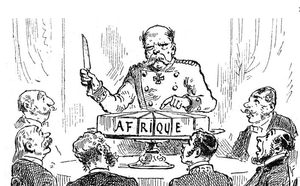 German Chancellor Bismarck leads the partitioning of Africa like a cake (contemporary cartoon) | |
| year 1884 |
Contents
April–June
- April 20 – Pope Leo XIII publishes the encyclical Humanum genus, denouncing Freemasonry and certain liberal beliefs which he considers to be associated with it.
- April 22
- A German protectorate is established over South-West Africa.
- May 1 – The eight-hour workday is first proclaimed by the Federation of Organized Trades and Labor Unions in the United States. This date, called May Day or Labour Day, becomes a holiday recognized in almost every industrialized country.
- May 16 - Sweden's Finance Minister Robert Themptander becomes his country's Prime Minister (1884–88).
- June 28 – The Norwegian Association for Women's Rights is founded.
July–September
- July 1 – First International Forestry Exhibition opens in Edinburgh, Scotland.
- July 3 – The Dow Jones Transportation Average, consisting of eleven transportation-related companies (nine railroads and two non-rail companies, Western Union and Pacific Mail), is created. The index is the oldest stock index still in use.
- July 5 – Germany takes possession of Togoland.
- July 7 – Nagasaki Shipyard, as predecessor of an aircraft and shipbuilding manufacturing brand in Japan, Mitsubishi Heavy Industries was founded in Kyushu Island.
- July 14 – German administration is established in Cameroon.
- August 22 – The Sino-French War (for control of Tonkin) breaks out (continues to April 1885).
- August 23 – Sino-French War – Battle of Fuzhou: French Admiral Amédée Courbet's Far East Squadron virtually destroys China's Fujian Fleet.
- September 15 – The invention of local anesthesia by Karl Koller is made public, at a medical congress in Heidelberg, Germany.
October–December
- October 22 - The International Meridian Conference in Washington, D.C. fixes the Greenwich meridian as the world's prime meridian.
- November 2 – Timișoara, Romania is the first town in Europe with streets illuminated by electric light.
- November 4 – 1884 United States presidential election: Democratic Governor of New York Grover Cleveland defeats Republican James G. Blaine in a very close contest, to win the first of his non-consecutive terms.
- November 15 – The Berlin Conference, which regulates European colonisation and trade in Africa, begins (ends February 26, 1885).
- December 1 - Porfirio Díaz (1830-1915) returns as President of Mexico, an office he will hold until 1911.[1]
- December 4 – Reformers in Korea who admire the Meiji Restoration in Japan stage the Gapsin Coup, with Japan's help. China intervenes to rescue the king, and help suppress the rebels.
- December 10 - The Third Reform Act widens the adult male electorate in the United Kingdom to around 60%.
- December 16 – The World Cotton Centennial world's fair opens in New Orleans.
Date unknown
- The first Christian missionary arrives in Korea.
- Police training schools are established in every prefecture in Japan.
- Parliamentarism is introduced in Norway.
- The water hyacinth is introduced in the United States, and quickly becomes an invasive species.
- An economic depression hits the United States.
- The Fredrika Bremer Association is founded in Sweden.
- Thomas Parker built a practical production electric car in Wolverhampton using his own specially designed high-capacity rechargeable batteries.
Events
| Event | Start | End | Description |
|---|---|---|---|
| Pax Brittanica | 1815 | 1915 | |
| Victorian era | 1840 | 1901 | |
| Berlin Conference | 15 November 1884 | 26 February 1885 | 1880s conference to regulate European colonization and trade in Africa |
New Groups
| Group | Image | Type | Description |
|---|---|---|---|
| Fabian Society | 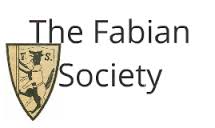 | According to itself, it aims to promote greater equality of power, wealth and opportunity, the value of collective action and public service, an accountable, tolerant and active democracy, citizenship, liberty and human rights, sustainable development, multilateral international cooperation | |
| Alibi Club | 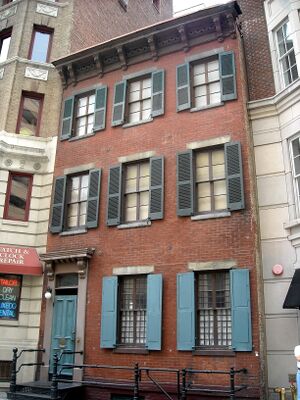 | a 50-member private, traditional club in Washington, D.C. ts members comprise of the Washington elite, including presidents, senators, among other prominent figures. | |
| American Historical Association |  | ||
| Ferris State University | 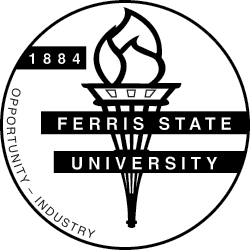 | Public | Michigan university |
| Wolf's Head |  | Secret society at Yale University. | |
| Lycée Janson-de-Sailly |  | Military ranks | Prestigious secondary school located in Paris |
| Bangor University |  | Welsh University with economic problems | |
| Temple University | 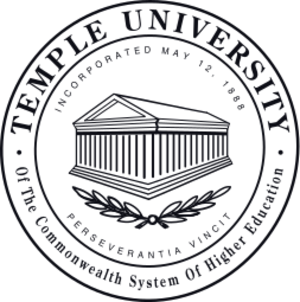 | Public (formerly private)State-relatedMulti-campusInternational | Large Philadelphia university |
| Norway/Conservative Party |  | Political party in Norway | |
| Svenska Dagbladet |  | Swedish corporate newspaper. Heavy Bilderberg habit. |
A Death
| Title | Born | Died | Place of death | Summary | Description |
|---|---|---|---|---|---|
| William Hunt | 12 June 1823 | 27 February 1884 | Saint Petersburg Russia | Lawyer Soldier | Southern union-supporter who became United States Secretary of the Navy, Minister to the Russian Empire and a Judge of the Court of Claims. |
Births
| Title | Born | Place of birth | Died | Summary | Description |
|---|---|---|---|---|---|
| Arthur Ransome | 18 January 1884 | Leeds UK | 3 June 1967 | Author Spook Journalist | |
| Rickard Sandler | 29 January 1884 | Torsåker Västernorrland County | 12 November 1964 | Politician | Prime Minister of Sweden in the 1920s. Swedish Minister for Foreign Affairs in the 1930s, then leader of the parliamentary Committee for Foreign Affairs until his death in 1964. Attended the 4th Bilderberg |
| John Moore-Brabazon | 8 February 1884 | 17 May 1964 | Politician Deep state operative | ||
| Clement Davies | 19 February 1884 | Wales Llanfyllin Powys | 23 March 1962 | Politician | Attended the first Bilderberg as Leader of the UK Liberal Party |
| Rachel Crowdy | 3 March 1884 | Paddington | 10 October 1964 | Activist | English nurse and social reformer, with some military connections. |
| Walter Layton | 15 March 1884 | 14 February 1966 | Politician Editor Deep state operative | The Economist/Editor 1922-38, The Economist/Chair 1944-63 | |
| Arthur Vandenberg | 22 March 1884 | US Michigan Grand Rapids | 18 April 1951 | Politician | US politician who went from "isolationist" to internationalist thanks to British spook honeytraps. |
| Harry S. Truman | 8 May 1884 | US Missouri Lamar | 26 December 1972 | Politician Farmer | US President 1945-1953. Signed off on the creation of the CIA, later unsuccessfully called for its reform. |
| Alexander Wiley | 26 May 1884 | US Wisconsin Chippewa Falls | 26 October 1967 | Politician | US Senator and Cold War hardliner who attended a Bilderberg in 1957 |
| Edvard Beneš | 28 May 1884 | Austria-Hungary Bohemia | 3 September 1948 | Politician | |
| Axel Rappe | 22 June 1884 | Sweden Stockholm | 31 October 1945 | Soldier | Swedish Army officer who planned a pro-German military coup during World War 2. |
| Charles De Visscher | 2 August 1884 | Belgium Ghent | 2 January 1973 | Judge Deep state operative | Egmont Institute/President 1947-1958 |
| Reginald Coupland | 2 August 1884 | 6 November 1952 | Historian Deep state actor | UK historian and member of the Milner Group inner circle | |
| İsmet İnönü | 24 September 1884 | Turkey İzmir Aidin Vilayet | 25 December 1973 | Soldier Politician | Turkish PM intermittently from 1923 to 1965 |
| Eleanor Roosevelt | 11 October 1884 | New York US | 7 November 1962 | Diplomat Activist Politician | |
| Guy Bartholomew | 17 October 1884 | 4 May 1962 | |||
| Eivind Berggrav | 25 October 1884 | Norway Stavanger | 14 January 1959 | Clergy | Norwegian Lutheran bishop who cooperated closely with the military intelligence service |
| Camille Gutt | 14 November 1884 | Belgium Brussels | 7 June 1971 | Central banker | First Managing Director of the IMF |
| Alexander Cadogan | 25 November 1884 | London Chelsea UK | 9 July 1968 | Diplomat | Permanent secretary to Anthony Eden |
| Elmer Bobst | 16 December 1884 | 2 August 1978 | VIPaedophile Deep state actor Businessperson | American businessman and deep state actor who worked in the pharmaceutical industry. VIPaedophile. |
Many thanks to our Patrons who cover ~2/3 of our hosting bill. Please join them if you can.